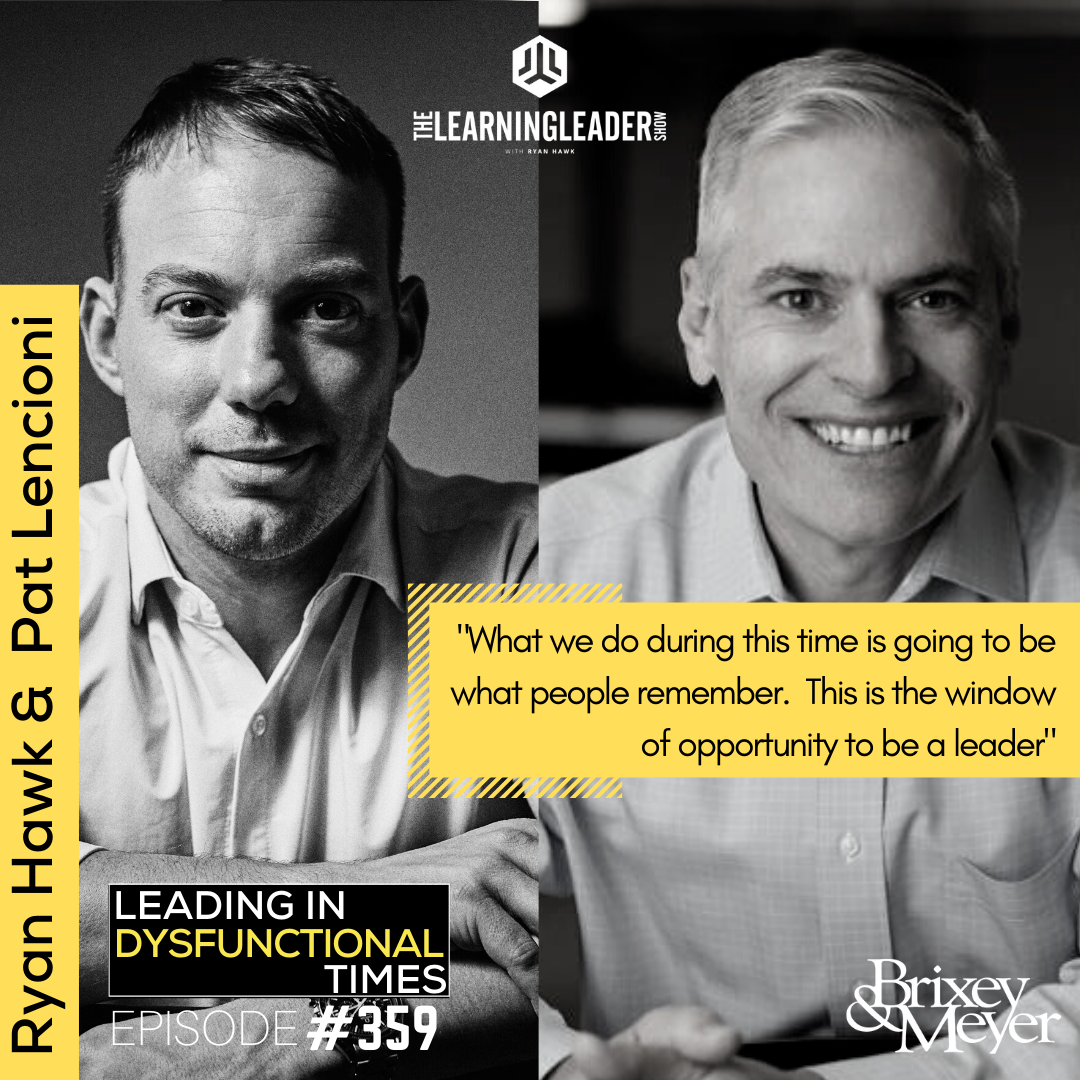Pat Lencioni is one of the founders of The Table Group and is the pioneer of the organizational health movement. He is the author of 11 books (The Five Dysfunctions Of A Team, The Ideal Team Player, The Motive), which have sold over 6 million copies and been translated into more than 30 languages. As President of the Table Group, Pat spends his time speaking and writing about leadership, teamwork, and organizational health and consulting with executives and their teams. Prior to founding the firm in 1997, Pat worked at Bain & Company, Oracle Corporation and Sybase.
FORBES recently called, WELCOME TO MANAGEMENT, “the best leadership book of 2020.”
To watch this on YouTube: Ryan Hawk & Pat Lencioni – Episode #359 – YouTube
Be part of “Mindful Monday” — Text LEARNERS to 44222
Subscribe on iTunes or Stitcher Radio
The Learning Leader Show
- Three actions for leaders in a perilous time:
- be exceedingly human. You should demonstrate your concern for the very real fears and anxieties that your people are experiencing, not only professionally and economically, but socially and personally. Even though you don’t have definitive answers to all of their questions, don’t let that keep you from listening to them and empathizing with their fears. And, contrary to conventional wisdom, you should not be hesitant to share your own concerns with your people. They want to know that they can relate to you and that they are not alone in their concerns.
- be persistent. This is not a time to hold back. Send people updates and regular communication, even if there is not a lot of new information and the message is largely personal. No one will look back at this time and say, “my manager was so annoying with all the encouraging emails checking in on me.” When people are isolated, over-communication is more important than ever.
- be creative. Try new things. Call semi-regular video-conference meetings that allow employees to not only talk about work, but to share their experiences dealing with this situation. Have them share movies and games and other tools that they are finding to be helpful with their families and invite them to tell stories about what is going on in their worlds. Crises provide an opportunity for people to come to know one another and establish bonds that will endure long after the crisis is over.
- This is not a time to be efficient. It’s a time to be present with people. Once they get that new sense of trust, then you can move on.
- Every company/family needs to be intentional about their thematic goal/rallying cry.
- Cohesiveness and innovation are the themes for The Table Group
- What we do during this time is going to be what people remember. This is the window of opportunity.
- People would rather be criticized than ignored.
- The opposite of love is not hate. It’s indifference.
- Pat is looking for that sense of “peace” that no matter what happens, we will be okay. (He tells a story about an NYC priest the night before he died “I”m not afraid.”)
- When you help others, your fears go down.
- Idle time and worry is what makes fear rise.
- Advice for parenting teenagers right now — “It’s a time for grace, not discipline.”
- How to establish a safe environment?
- Empower people to take risks. When they stumble, it’s okay. Failure = learning moment
- 2 biggest red flags of a bad teammate – what are the symptoms/ hardest things to overcome?
- Insecurity and selfishness
- Good teammates?
- “They take ownership of their mistakes and work to correct them.” Must take ownership of it to improve.
- The Ideal Team Player — Humble, Hungry, Smart.
- Download for free: “The three questions to ask your family” on Pat’s website The Table Group
- Does Love have a place in leadership? You need to love your players even if you don’t like them. You have to do what is in their best interest.
- Pat’s next book?
- “The Heroic Manager”
- The Five Dysfunctions Of A Team:
- Absence of trust – unwilling to be vulnerable within the group
- Fear of conflict – seeking artificial harmony over constructive passionate debate
- Lack of commitment – feigning buy-in for group decisions creates ambiguity throughout the organization
- Avoidance of accountability – ducking the responsibility to call peers on counterproductive behavior which sets low standards
- Inattention to results – focusing on personal success, status and ego before team success
- Here is WHY joining a Learning Leader Circle is a good idea…
Resources:
- Read: WELCOME TO MANAGEMENT
- Be part of “Mindful Monday” — Text LEARNERS to 44222
- Read: The Motive
- Connect with me on LinkedIn
- Join our Facebook Group: The Learning Leader Community
- To Follow Me on Twitter: @RyanHawk12
More Learning:
Episode 078: Kat Cole – From Hooters Waitress To President of Cinnabon
Episode 216: Jim Collins — How To Go From Good To Great
Episode #300: AJ & Keith Hawk – How To Instill Work Ethic & Curiosity In Your Children
Episode #303: General Stanley McChrystal – The New Definition Of Leadership


Leave A Comment